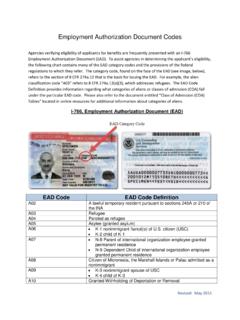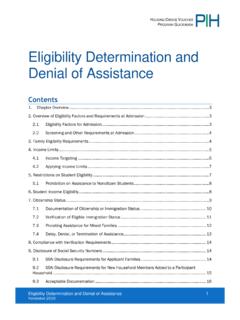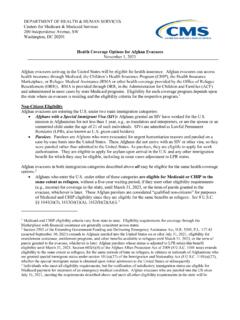Transcription of SAVE Program Guide
1 Systematic Alien Verification for Entitlements save Program Guide WARNING: This document is FOR OFFICIAL USE ONLY (FOUO). This document is FOR OFFICIAL USE ONLY and remains the property of Department of Homeland Security (DHS), United States Citizenship and Immigration Services (USCIS), Systematic Alien Verification for Entitlements ( save ) Program . It contains information that may be exempt from release by the Freedom of Information Act (5 552). It is to be controlled, stored, handled, transmitted, distributed, and disposed of in accordance with DHS policy relating to FOUO information and is not to be released to the public or other personnel who do not have a valid need to know without prior approval by the DHS, USCIS, save Program . When left unattended, this document must be stored in a locked container or area offering sufficient protection against theft, compromise, inadvertent access and unauthorized Official Use Only save Program Guide Revised MAY 2018 Page i TABLE OF CONTENTS 1.
2 INTRODUCTION .. 1 2. save Program Overview .. 1 What is the save Program .. 1 Governing Legislation .. 1 The Creation of the save Program .. 1 The Evolution of the save Program .. 2 3. save MEMORANDUM OF AGREEMENT .. 5 Eligibility Criteria .. 5 save s Responsibilit ies .. 5 save Transaction Charges .. 5 User s Responsibilities .. 6 Proper System Use .. 6 Determination of Benefits .. 7 Due Process .. 7 Non-discrimination .. 7 save Verification CaseCheck .. 7 Training .. 7 Privacy Protections .. 8 Dispute Resolution .. 8 4. SAFEGUARDS .. 9 USCIS .. 9 Participating User Agencies .. 9 USCIS Record Keeping .. 9 save Monitoring and Complia nce (M&C) .. 9 5. Verification Process Overview .. 10 For Official Use Only save Program Guide Revised MAY 2018 Page ii The Verification Process .. 10 Electronic Verification.
3 11 Paper-based Verification .. 12 Verification Response Times .. 13 Special Circumstances .. 13 6. Support .. 14 Training Options .. 14 Resources .. 14 Contact Information .. 15 7. APPENDIX A: ACRONYMS AND ABBREVIATIONS .. 16 8. APPENDIX B: FACT SHEETS .. 17 For Official Use Only save Program Guide Revised MAY 2018 Page 1 1. INTRODUCTION The Systematic Alien Verification for Entitlements ( save ) Program Guide outlines the Program s policies and procedures, as well as the roles and responsibilities of participants. This Guide contains requirements that are incorporated by reference in the memorandum of agreement (MOA) between the Department of Homeland Security (DHS), United States Citizenship and Immigration Services (USCIS) and the user agency. Some agencies have a computer matching agreement (CMA) rather than an MOA, and although there are some differences, the provisions found in the MOA have a CMA equivalent.
4 Additionally, documents incorporated by reference in this Guide may also contain save System requirements. Your agency must monitor save notifications to be aware of when save updates requirements and training tutorials and to ensure that save users are following the most recent procedures and policies. The design of this Guide provides both training and guidance to reference materials to help answer questions that may arise regarding the save Program and the verification process. 2. save Program OVERVIEW What is the save Program save is an inter-governmental initiative using a web-based service to help federal , state and local benefit-issuing and licensing agencies and other governmental entities determine the immigration status of applicants for public benefits or licenses (hereinafter benefits ) so only entitled applicants receive them. save verifies the status of non-immigrants, immigrants, and certain naturalized and derived citizens.
5 save does not determine an applicant s eligibility for a specific benefit. save will provide timely customer-focused immigration status information to authorized agencies in order to assist them in maintaining the integrity of their programs . This includes promoting the use of automated systems to enhance inter-agency collaboration, customer service, efficiency, and information privacy. Governing Legislation The Creation of the save Program In 1986, Congress passed the Immigration Reform and Control Act (IRCA), public Law (Pub. L.) No. 99-603. This legislation altered the relationship between certain federal benefit granting agencies and the applicants for benefits they administered. IRCA prohibited the granting of specified federal public benefits to certain citizens and imposed obligations upon benefit granting agencies to determine the citizenship and/or immigration status of applicants for these benefits.
6 IRCA required that each benefit applicant declare in writing whether he or she is a citizen or national of the United States. If the applicant is not a citizen or national of the United States, the applicant must show that he or she is in a satisfactory immigration status, as set forth by federal law, to receive that benefit. IRCA required the Immigration and Naturalization Service (INS), the predecessor agency to what is now Department of Homeland Security (DHS), United States Citizenship and Immigration Services (USCIS), to establish an automated system for verifying the immigration status of noncitizen applicants for certain federal benefits. This system was accessible to federal , state, and local benefit-issuing agencies and institutions that would administer those federal benefits. Table 2 lists the agencies and benefits covered by IRCA. For Official Use Only save Program Guide Revised MAY 2018 Page 2 save was created in 1987 out of a previously existing pilot Program to comply with these IRCA requirements and to oversee and administer the automated system used to verify immigration status and naturalized or derived citizenship.
7 Soon after its creation, subsequent legislation built upon and expanded save s role. Agencies and Benefits Covered by IRCA. Department of Health and Human Services (HHS) Temporary Assistance to Needy Families (TANF) Program Medicaid Program Certain Territorial Assistance programs Food Stamps Department of Labor (DOL) Unemployment Compensation Program Department of Education (DOE) Title IV Educational Assistance programs Department of Housing and Urban Development (HUD) Certain Housing Assistance programs Please Note: The Personal Responsibilit y and Work Opportunity Reconcili ation Act of 1996 removed the IRCA requirement that state agencies verify elig ibility for food stamps with save . The Evolution of the save Program About a decade after save was created, the Personal Responsibility and Work Opportunity Reconciliation Act of 1996 (PRWORA), Pub.
8 L. No. 104-193, was passed and provided additional restrictions for certain programs funded by federal , state and local governments. PRW ORA established stricter citizenship or immigration status elig ibility requirements for many programs and rendered certain categories of citizens ineligible for many benefits. Under PRWORA, an applicant must be a qualif ied alien to be elig ible for many benefits. The Illegal Immigration Reform and Immigrant Responsibilit y Act of 1996 (IIRIRA), Pub. L. No. 104-208, and the Balanced Budget Act of 1997, Pub. L. No. 105-33 defined a qualif ied alien as: An alien who is lawfully admitted for permanent residence under the Immigration and Nationality Act (INA) [8 1101 et seq.]; An alien who is granted asylum under Section 208 of the INA [8 1158]; A refugee who is admitted to the United States under Section 207 of the INA [8 1157]; An alien who is paroled into the United States under Section 212(d)(5) of the INA for a period of at least one year [8 1182(d)(5)]; An alien whose deportation is being withheld under Section 243(h) of the INA (as in effect prior to April 1, 1997) [8 1253] or whose removal has been withheld under Section 241(b)(3) [8 1231(b)(3)]; For Official Use Only save Program Guide Revised MAY 2018 Page 3 An alien who is granted conditional entry pursuant to Section 203(a)(7) of the INA as in effect prior to April 1, 1980 [8 1153(a)(7)]; An alien who is a Cuban/Haitian Entrant as defined by Section 501(e) of the Refugee Education Assistance Act of 1980 [8 1153].
9 Or Certain aliens who have been battered or were subjected to extreme cruelty [8 1641(c)]. PRWORA applies only to nonexempt federal public benefits and state and local public benefits. Thus, PRWORA restrictions do not apply to all federal , state and locally funded activities and programs . Further, access to important emergency health services, public health assistance and community-based services necessary to protect life and safety remain accessible to all citizens. Benefit-granting agencies should determine whether the particular Program or benefit they administer is providing a federal public benefit or a state or local benefit. Once this is determined, the benefit provider can decide whether Title IV of PRWORA or other applicable laws require verification of an applicant s citizenship or immigration status. A federal public benefit, as defined in PRWORA, is: 1) Any grant, contract, loan, professional license or commercial license provided by an agency of the United States or by appropriated funds of the United States; and 2) Any retirement, welfare, disability, public or assisted housing, post-secondary education, food assistance, unemployment benefit or any other similar benefit for which payments or assistance are provided to an individual, household or family eligibility unit by an agency of the United States or by appropriated funds of the United States.
10 According to PRWORA, the definition of state and local public benefit is identical to the federal public benefit, except that it substitutes state or local government for the United States. A federal public benefit will never be a state or local benefit, and vice versa, because a benefit cannot meet both definitions. Accordingly, if any federal funds are used, a benefit is by definition federal regardless of whether state or local funding is also used. Furthermore, IIRIRA as amended, requires DHS-USCIS to respond to inquiries by federal , state and local benefit-issuing agencies seeking to verify or determine the citizenship or immigration status of any individual within the jurisdiction of the agency for any lawful purpose. DHS-USCIS is currently using the save Program s automated and manual verification processes to provide federal , state and local benefit-issuing agencies and institutions with information that will assist in verifying an individual s immigration status.







